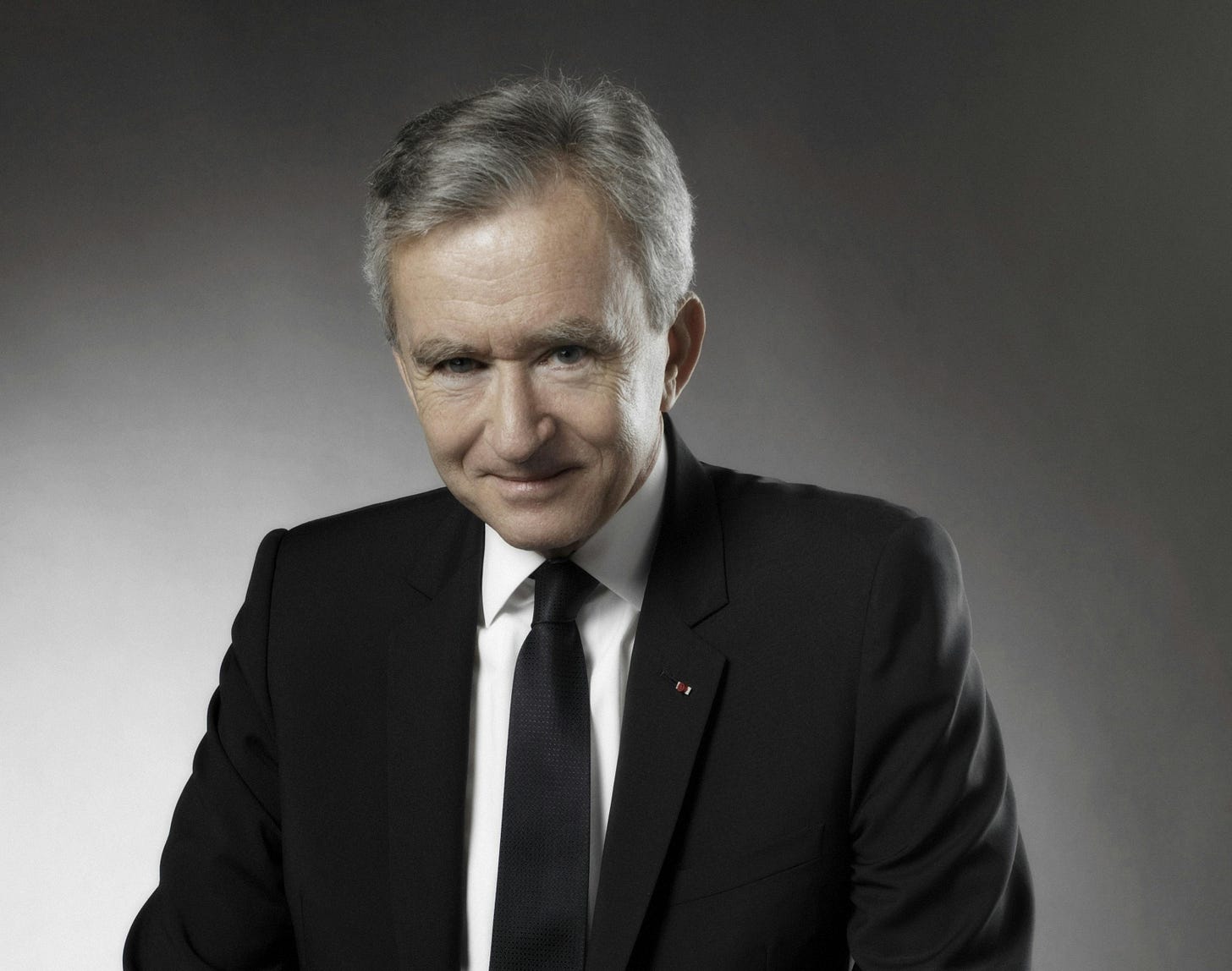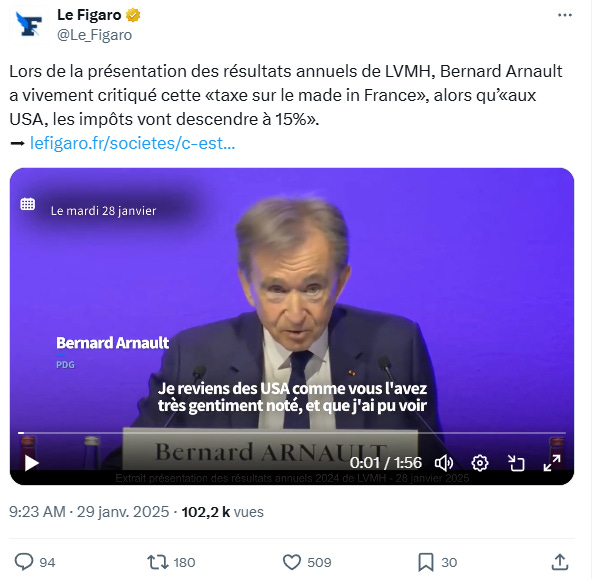Bernard Arnault, made in 1984
An empire built on luxury is ultimately an empire of futilities . Brands are nothing but fleeting air.
At LVMH's annual general meeting, Bernard Arnault boldly claimed that imposing increased taxes on French multinationals, known for their sophisticated tax avoidance strategies, was tantamount to taxing "made in France". Small business owners lack the financial means to hire armies of corporate lawyers and tax consultants, resulting in them paying comparatively higher taxes in France than LVMH does.
A significant portion of the luxury goods LVMH sells are not manufactured in France. The exceptions are wines and spirits, which are Protected Geographical Indications (IGP) and inherently cannot be produced elsewhere, and genuine artisanal crafts. These crafts cannot be outsourced because mastering them requires years of dedicated apprenticeship.
"In the USA, taxes will drop to 15%"
Bernard Arnault is lying. Although he was indeed invited to Donald Trump's inauguration, there is currently no indication that corporate taxes will decrease by 15% in the United States. In 2024, the effective corporate tax rate in the USA was 9%.
Moreover, it's worth reminding Mr. Arnault that the global minimum corporate tax rate of 15% is an international commitment made by the G7, so he's treating us like naive newcomers. This has nothing to do with Trump.
Mr. Arnault should be more concerned about the tariffs promised by Donald Trump. These will primarily hit LVMH, which, to our knowledge, manufactures nothing in the USA except for some Tiffany's products, a company bought for $15.8 billion in 2021. Wines, spirits, perfumes, cosmetics, hand bags —the usual targets—while Trump's wants to replace taxes with tariffs.
Bernard Arnault seems stuck in the 1980s and 1990s. You know, the money years. Celebrities, the Cannes Film Festival, supermodels, Saint-Tropez, the Palace, the Bains-Douches, super yachts, parties that never end, coke in stock, and all that jazz.
"Brands" are inseparable from advertising, hence from mass media, all of which—fortunately—are dying. Especially those owned by Bernard Arnault. Le Parisien? A loss of twenty-four million euros in 2024. Les Echos? Six million euros in losses, to our knowledge, with layoffs on the horizon (voluntary departures). Paris Match, recently bought from Arnaud Lagardère? A readership over 65 and the laughingstock of France due to its defense of the Macron couple.
With the rise of social media and independent press, it's hard to convince the commoner that buying a T-shirt branded Christian Dior guarantees a spot in the VIP section.
Helmut Fritz was a visionary...
Contrary to popular belief, LVMH does not rank among France's top employers, boasting a headcount of 40,000 positions—tenfold less than Carrefour and threefold less than Vinci. Its selective distribution division, notably Sephora, is faltering. Moreover, the allure of their "brands" seems to have waned: donning Louis Vuitton might cast one as a gangster, Kenzo as gauche, and Christian Dior a Gabriel Attal or Olivier Véran, tow of France’s most hated politicians...
Bernard Arnault is less an entrepreneur or an industrialist, unlike contemporaries such as Vincent Bolloré or Rodolphe Saadé,. Rather, Arnault is a financier whose empire was erected on the foundations of state beneficence (courtesy of French taxpayers) and methods that have long been questionnable For a deeper dive into this subject, please refer to our article below.
Nor should we overlook the peculiar embrace of "woke" culture at the Olympic opening ceremony, a grand stage for LVMH, called upon by Emmanuel Macron to salvage the event amidst the organizing committee's sponsorship woes. The image of the blue satyr in a thong was met with international derision or distaste, casting a shadow over LVMH’s brands.
L'Eclaireur has made the principled decision to eschew all forms of subsidies, both public and private, as well as advertising and crowdfunding. Our existence and our independanc are sustained exclusively by your subscriptions.
“It is a trend for the last ten years for brands to get together, for one simple reason. It is the world market, to be reached globally, that requires a much greater investment. One brand alone will have great difficulty, When you buy Dom Pérignon or Dior perfume, or a Vuitton bag, you don’t know it belongs to the same group. It is only backstage that you find the economies of scale that is the basis of our success.” stated Bernard Arnault to the New York Magazine in 1999.
Economies of scale? For "brands," these were predominantly achieved through marketing, specifically through the global purchasing of advertising space in mass media. That era, however, has come to a close. Otherwise economies of scale have not been more pronounced than in other industries.
The tangible decline of globalization, coupled with a growing international disdain for Western values, suggests that despite LVMH's impressive market capitalization, its luxury offerings might not weather the upcoming storm. This is because the allure of luxury no longer mesmerizes the masses; those who sparingly indulge in luxury with their hard-earned savings, the primary drivers of LVMH's revenue, are increasingly priced out and becoming more discerning. One chooses to consume less but with greater discernment.
True luxury, then, is found in eschewing brand names, avoiding the expenditure of tens of thousands of euros at the Louis Vuitton store in Gstaad, an indulgence for Russian oligarchs or the out-of-touch ultra-wealthy. This represents a profound cultural shift. For men, it means commissioning bespoke suits from renowned tailors like Cifonelli in Paris, Henry Poole or Edward Sexton in London, Gaetano Aloisio in Rome, or Pino Peluso in Naples, and selecting footwear from artisans like Pierre Corthay, Stefano Bemer, Norman Vilalta, or Gazzianio & Girling.
If bespoke is beyond one's budget, industrial made-to-measure suits from Lanieri, Pini Parma, or Julien Scavini offer a superior experience at a fraction of the cost of an off-the-rack "designer" garment. As for women's fashion, the author demurs, acknowledging his lack of expertise.
Examining LVMH's portfolio, beyond real estate (chiefly suffering in the USA) and land assets (such as vineyards), the majority are intangible. There are manufacturing units, but their value is diminished by their modest industrial scale. A brand's worth is only as enduring as the attention it commands, and that attention is ephemeral.
Contrast this with the tangible assets of others: Elon Musk with his satellite networks, electric vehicle and rocket factories, and the platform for Western political discourse; Rodolphe Saadé with his fleet of ships; Vincent Bolloré with his libraries of unique books, music, and films; Xavier Niel with his communication infrastructure; and the Dassault family with their aerospace factories and the intellectual property of CATIA. LVMH stands as a symbol of what ails France, prioritizing appearance over substance and deed.
Bernard Arnault, sitting atop a formidable financial fortress, buoyed by banks and political allies, might see his empire meet the same fate as Boussac, the faultering conglomerate acquired with French state aid in 1984 at the core of LVMH. . Utimately, it is the consumer who will decide.






